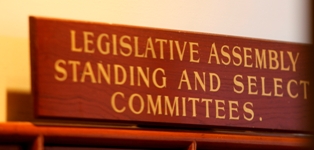
Parliamentary committees are groups of members of Parliament appointed by one or both Houses to undertake a particular task, such as investigating legislative proposals or the operation of government policies and programs. Committees consider an issue in detail and report to the House with their findings and recommendations.
Committees can raise public awareness and encourage debate on issues under consideration by Parliament. They also provide an opportunity for public engagement and participation in Parliamentary processes.
Committees can call for submissions from the public and hold public hearings and meetings that provide opportunities for interest groups, experts and individual citizens to inform the committee of their views on particular topics.
The Legislative Assembly has different types of committees:
- Standing committees are appointed for the life of the Parliament to consider issues or subject areas such as road safety or particular portfolio or policy areas. The Assembly has three Specialist Standing Committees and five Portfolio Standing Committees.
- Statutory committees are created by Acts of Parliament and committees continue to exist while those Acts are in force. Their functions may include examining Bills before Parliament, or monitoring and reviewing the work of statutory bodies such as the Independent Commission Against Corruption.
- Select committees are temporary committees appointed to inquire into specific issues, for instance bushfires or tobacco smoking.
These committees may be made up of members of the Legislative Assembly or of members from both Houses of Parliament (known as joint committees).
More Information
For further information, please refer to the links below:
Parliamentary Committees Information Sheet
Engaging with Committees
